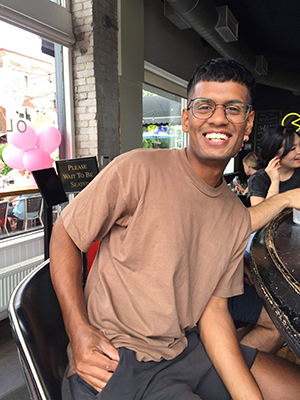Trust Yourself: Michelle Ha in Conversation with Ajith Thangavelautham

Malahat Review Marketing and Promotions work-study student Michelle Ha talks with Ajith Thangavelautham, winner of the 2020 Open Season Award for fiction with his story, "Moonbird."
Ajith Thangavelautham is a writer of Indian and Sri Lankan descent, born and raised in Canada, where he studies Mechanical Engineering at the University of Toronto. His home is Scarborough, Ontario, and his favourite foods are strawberry milkshakes, and his Grandma’s goat curry. Feeding off the diversity of the city, he writes to get a better understanding of the world and his place in it. When he’s not writing or studying, he enjoys playing basketball and making music.
What was the process like when you were writing “Moonbird”? How did you come up with the structure and writing style of your piece?
Knowing I wanted to focus on family, the very first thing I did was make a family tree for “Moonbird,” detailing the relationships of the characters, both biological and emotional. From there I decided who I wanted to be my main characters and why, proceeding to flesh them out even further: their personalities, histories, desires, and, most importantly, their names. After this, everything else fell into place, like the setting and plot. The structure of the story also revolved around the characters, as I wanted each of the four to have a chance to be the focal point, in order to provide a breadth of experiences to the reader and enhance the understanding of the prevalent themes.
I'm quite interested to know if there was a particular inspiration for “Moonbird.” Were there any considerable struggles you faced while you were writing between the first and the final draft?
I wrote “Moonbird” after reading “The God of Small Things” by Arundhati Roy, which immediately inspired me to pick up my pen/laptop. Her powerful characterization (not to mention her beautiful storytelling) felt like a direct challenge to me, being one of my major writing weaknesses. With that in mind, my biggest struggle was not only getting into the minds of the characters and creating realistic relationships between them, but also showcasing these things on paper. The easiest was definitely Mahilan, who I personally have the most in common with, but for the others it required a lot of thought and observation, especially when thinking about their opinions without letting my personal biases infiltrate. This effort lead to what I hope is a more balanced story, but more importantly a deeper understanding and closer relationship to my own family.
Your short fiction touches on the theme of family, as well as the duality of first- and second-generation immigrants. In writing “Moonbird,” was there a message or collective understanding on these themes you wished to convey in your story?
I had been thinking about the concept of family for a while, its strengths and shortcomings, particularly in the South Asian diaspora. What obligations (if any) do we have to family and the culture, history, and legacy it entails? How do we cope with values that don’t resonate, but are branded on our skin regardless; how do these scars manifest themselves? Why does this intergenerational trauma exist, has it always existed, and how do we end the cycle? This “we” very clearly represents the younger generation. Since they probably won’t read this interview I don’t mind saying that “Moonbird” was written with my siblings in mind, and I aimed to provide some measure of guidance and direction for them when pondering these questions. My hope is that, even with the biases inherent in this writing, readers of all ages and experiences can derive some level of compassion for misunderstood loved ones, including themselves.
Writing can be a tricky sport if the creative juices aren't flowing smoothly. How do you overcome writer's block? And what advice might you give other writers, especially emerging writers, when it comes to cultivating their craft?
I feel lucky to have a diverse set of interests in my life that I am able to constantly switch my attention and find inspiration. While it’s important to search for inspiration, and it’s crucial to be ready whenever this entity travels through us, I think it’s very valuable to be able to force yourself to work on something through various blocks. Obviously, this is much easier when we resonate with the creative work being done, but that isn’t always the case. Even so, I think we can surprise ourselves with the innate ability to create that’s always present in our bodies. In terms of writing, this can take the form of “vomiting” words and sentences and ideas onto the paper, or doodling the scene you’re attempting to depict. TL;DR: trust yourself.
Are you currently working on any other projects? And where might you see yourself in the future?
As of right now I’m actually working on a beat tape and finishing up my last semester of school, but I do have some interesting plots for potential short stories. As someone who hasn’t formally studied creative writing, I’m still exploring where I fit in as a writer and searching for confidence in my voice. Eventually, with more life under my belt, I hope to write a novel, but in the meantime, I will continue writing short stories while exploring other writing mediums such as screenwriting and poetry.

Michelle Ha
* * * * * * * *









